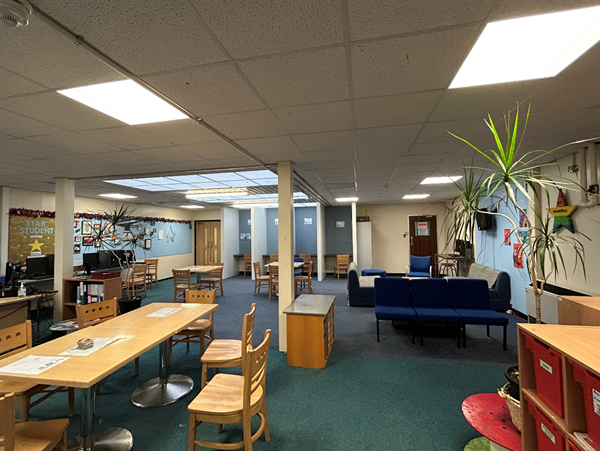SEND & Inclusion Information
Special Educational Needs and Disability (SEND) means that a child is facing specific challenges with areas of school life at the moment.
It may be that the child is finding learning difficult and needs to work at a different pace. It may be that the child has an emotional or social issue, a behavioural issue or a physical disability. Sometimes these difficulties only last for a short time and some continue through a child's school life.
How do we help at South Wolds?
Helping your child to make progress is a partnership between home and school. The government has given schools clear guidelines on how help is given - the document is called the SEND code of practice.
Parents should always inform school of any known, physical, emotional or behavioural difficulties before the child enters school, so the appropriate support can be agreed and arranged.
Who should I contact at South Wolds?
Contact the Inclusion Team on 0115 9373506
Where can I access further information?
Our SEND Information Report will give you much more detail on how we work at South Wolds.
Both our SEND Information Report and SEND policy can be downloaded using the links below.
You can also find out more about Nottinghamshire's local offer.
Frequently Asked Questions
What kinds of special educational needs does the school/setting make provision for?
The South Wolds Academy and Sixth Form is an inclusive mainstream school. Our aim is for all children to achieve or surpass their academic and social potential. There are a wide range of special educational needs for which children may need extra support. Sometimes these needs are only short term, others may continue through a child’s school life and some children may have a specific diagnosis. All children are treated as individuals and their needs are assessed on an individual basis. However, children’s needs generally fall into one or more of the following categories; Cognition and Learning, Communication and Interaction, Social, mental and Emotional Health, Sensory and/or Physical Needs.
How does the school know if pupils need extra help and what should I do if I think that my child may have special educational needs?
We liaise very closely with our primary schools and work extensively on the transition between the key stages. If staff within the Academy have concerns that an individual pupil has special educational needs then they will share these with the SENCO and/or Inclusion Manager who will identify if this is the case. If a parent thinks their child may have special educational needs then they should contact the Inclusion Manager and/or SENCO as soon as possible. Where it is determined that a pupil does have SEND, parents will be formally advised of this and the decision will be added to the pupil’s records. The aim of formally identifying a pupil with SEND is to help school ensure that effective provision is put in place and so remove barriers to learning. The support provided consists of a four-part process:
- Assess
- Plan
- Do
- Review
Assess
This involves clearly analysing the pupil’s needs using the class teacher’s assessment and experience of working with the pupil, details of previous progress and attainment, comparisons with peers and national data, as well as the views and experience of parents. The pupil’s views and, where relevant, advice from external support services will also be considered. Any parental concerns will be noted and compared with the school’s information and assessment data on how the pupil is progressing. This analysis may require regular review to ensure that support and intervention is matched to need, that barriers to learning are clearly identified and being overcome and that the interventions being used are developing and evolving as required. Where external support staff are already involved, their work will help inform the assessment of need. Where they are not involved they may be contacted, if this is felt to be appropriate, following discussion and agreement from parents.
Plan
Planning will involve consultation between the Learning Support Team and parents to agree the adjustments, interventions and support that are required; the impact on progress, development and or behaviour that is expected and a clear date for review. Parental involvement may be sought, where appropriate, to reinforce or contribute to progress at home. All those working with the pupil, including support staff, will be informed of their individual needs, the support that is being provided, any particular teaching strategies/approaches that are being employed and the outcomes that are being sought. All of this information is identified in a Learning Needs Profile.
Do
The class teacher remains responsible for working with the child on a day-to-day basis. They will retain responsibility even where the interventions may involve group or one-to-one teaching away from the main class teacher. They will work closely with teaching assistants and /or relevant specialist staff to plan and assess the impact of support and interventions and links with classroom teaching. Support with further assessment of the pupil’s strengths and weaknesses, problem-solving and advice on the implementation of effective support may be provided by the Learning Support Team or external agencies, if appropriate.
Review
Reviews will be undertaken in line with agreed dates. The review process will evaluate the impact and quality of the support and interventions. It will also take account of the views of the pupil and their parents. The class teacher, in conjunction with the identified member of the Learning Support Team will revise the support and outcomes based on the pupil’s progress and development, making any necessary amendments going forward, in consultation with parents and the pupil. Parents will be provided with clear information about the impact of support to enable them to be involved in planning the next steps. If a child has lifelong or significant difficulties, they may undergo a Statutory Assessment Process of Education, Health and Care Plan (EHCP) which is usually requested by the school but can be requested by a parent. This will occur where the complexity of need, or a lack of clarity around the needs of the child are such that a multi-agency approach to assessing that need, to planning provision and identifying resources, is required.
How does the school evaluate the effectiveness of its provision for pupils with special educational needs? This is achieved by:
- Tracking the progress, behaviour and attendance of all SEND students
- Quality Assurance of the work of the Learning Support Team and the Quality of Teaching for SEND students
- Collecting and evaluating feedback from parents and students
- Through external evaluations such as Ofsted
How will both the school and I know how my child/young person is doing and how the school/setting help me to support their learning?
Teachers report to parents on progress three times every year. The performance of SEND students is monitored in “Closing the Gap” meetings and intervention is put in place where there are concerns about progress. For each year group there is a cycle of:
• Parents' evenings
• Report Assessments
•SEN Reviews with an identified member of the Learning Support Team, as appropriate.
What is the school’s approach to teaching pupils with special educational needs? Every effort will be made to educate pupils with SEND alongside their peers in a mainstream classroom setting. The first response for all pupils should be through high quality teaching (quality first teaching) within the classroom. Teachers will make the necessary adjustments (identified in the Learning Needs Profile) to enable the student to access teaching and learning. Where the adjustments are not successful, the teacher or Subject Performance Leader will consult the Learning Support Team on any additional adjustments that may be necessary.
How will the curriculum and learning be matched to my child/young person’s needs?
An individual's curriculum is agreed by key staff across the Academy including the SENCO, Deputy Head Teacher – Curriculum and Standards, Head of Year and Inclusion Manager. Parents will be involved as is appropriate. Learning Needs Profiles identify the adjustments the teacher needs to make for the students to access teaching and learning.
How are decisions made about the type and amount of support my child/young person will receive?
Decisions on the nature and amount of support will be taken by the SENCO and the Inclusion Manager, using the resources available for each child.
How will my child/young person to be included in activities outside the classroom, including school trips?
The Educational Visits Co-ordinator will ensure that appropriate individual risk assessments are completed in order to identify any additional support that will be needed to ensure participation. The Academy has an excellent track record in including SEND students however, this may not be possible if we cannot mitigate the risk to the individual students or all other students.
What support will there be for my child/young person’s overall well-being?
Support for well-being is provided through our Pupil Support Teams: Pastoral Teams, Inclusion Support and Learning Support.
Who is the school/setting’s special educational needs co-ordinator (SENCO) and what are their contact details?
In the first instance, parents should contact the Learning Support Team on extension 105 and they will be referred to the Inclusion Manager or another member of the Learning Support Team.
The school's named SENCO is Chloe Fox.
What training have staff supporting special educational needs had and what is planned?
All staff are provided with information about all SEND pupils through CPD and training events throughout the year. Specialist training is delivered as appropriate to specific needs. Learning Needs Profiles set out the adjustments that staff need to make to enable students to access teaching and learning.
What specialist services and expertise are available or accessed by the setting/school?
The following services may be involved as appropriate:
- Schools and Families Support Services
- Sensory Impaired Support
- Speech and Language Therapy Service
- Communication and Interaction Team
- Educational Psychology Service
- School nurse / Health Visitor
- Community Paediatrician
- Occupational Health
- Physical Disability Support Services
- Physiotherapy
- Parent Partnership
- Targeted Support
How will equipment and facilities to support pupils with special educational needs secured? How accessible in the school/setting?
Equipment is available as appropriate to specific needs. The school has been adapted to accommodate children with physical disabilities and has several purpose-built disabled toilets. The school is mainly on one level and where it is not, lifts are available.
What are the arrangements for consulting parents of pupils with special educational needs? How will I be involved in the education of my child/young person?
The Academy will ensure that a member of the Learning Support Team attends review meetings with parents and, as requested, at primary schools. The Inclusion Manager and/or Assistant Inclusion Lead are also available at Parents' Evenings and are available by telephone or email.
What are the arrangements for consulting young people with SEN and involving them in their education?
We value and celebrate children being able to express their views on all aspects of school life. If your child ha an EHC Plan then their views will be obtained before any meetings and will form part of the review.
What do I do if I have a concern or complaint about the SEN provision made by the school/setting?
Parents should always contact the Learning Support Team on extension 105 if they would like to discuss any concerns they have. The Trust's complaints policy is published on the website and should be used for complaints about SEN provision.
How does the governing body involve other organisations and services (e.g. health, social care, local authority support services and voluntary organisations) in meeting the needs of pupils with special educational needs and supporting the families of such pupils?
The Academy draws on strong working relationships and links with external support services in order to fully support our SEN pupils, aid school inclusion and provide support for parents. Multi-agency meetings are convened as appropriate.
How does the school/setting seek to signpost organisations, services etc who can provide additional support to parents/carers/young people?
The Learning Support Team will signpost appropriate organisations to parents/carers/young people.
How will the school/setting prepare my child/young person to:
i. Join the school/setting?
Where a child with SEND joins the Academy outside the normal round of transition, the Inclusion Manager and SENCO will work to ensure that they are placed on an appropriate curriculum, receive the appropriate support with resources available and that the relevant information and advice is shared with teachers. Where necessary, CPD will be put in place for staff and a Learning Needs Profile will be agreed and distributed.
ii. Transfer between phrases of education (e.g. early years to primary, primary to secondary etc)?
Intensive work is undertaken with primary schools between Key Stages 2 and 3, including personalised and extensive transition programmes as appropriate.
iii. Prepare for adulthood and independent living?
For some SEND pupils, transition visits are arranged with colleges, as appropriate, and some pupils are delivering TITAN travel (Travel Independence Training Across the Nation.)
Where can I access further information?
For more information, details of the SEND policy and SEND Information Report can be found on The South Wolds Academy website, or you can contact the Learning Support Team on extension 105. Alternatively, please see “Notts Help Yourself”
Inclusion Support
The Inclusion Support team are based in an area of school called The Bridge. The Team are non-teaching staff who understand and support the individual needs of students. The team work closely with the Pastoral Team and Heads of Year.

Within the Inclusion Team we have specialists who can advise in;
- Special Educational Needs (SEN)
- Transition support between Key Stages
- Child Protection and Safeguarding
- Attendance and Anxiety Related Non Attendance (ARNA)
- Emotional Health
- Physical health needs
The Team follow a child-centric approach and our work is guided by the SEN graduated response and Nottinghamshire County Council’s Pathway to Provision.
The Bridge is a multi-use area in school for students who for complex reasons may need time out, someone to talk to, the chance to ease sensory overloads, to access a sensory room and outside area and where additional learning support and interventions are delivered. We have a separate school entrance where identified students can arrive and leave to alleviate sensory and anxiety needs.
The team work closely with, and make referrals to, a variety of agencies and specialists from outside school including,
- Educational Psychologists
- Schools and Families Specialist Services
- Child and Adolescent Mental Health services - CAMHS
- The Healthy Families Team -HFT
- The Nottinghamshire Family Service
- Positive Futures
For complex needs we also work closely with Social Care and the Multi Agency Safeguarding Hub (MASH).
The team support vulnerable students through a key worker process where students and parents are linked to a team member to provide a single point of contact and consistency of care.
Students with more complex needs will be issued with a student needs profile where appropriate for;
- Medical needs, or
- Emotional health needs, or
- SEN needs, or
- Physical needs
These student needs profiles describe the needs of a student and the reasonable adjustments staff are required to make.
The team also include our cover supervisors who support students either in The Bridge or classrooms.
The Team
The Team is led by Oliver Askham, Assistant Head Teacher Attendance and Inclusion, and the team comprises:
- SENCO - Chloe Fox
- Inclusion Manager - Jake Murphy
- Attendance and Family Liaison Officer - Claire Till
- Assistant SENCO – Beth Guigno
- Assistant Inclusion Lead - Louise Delapena
- Vulnerable Support Lead - Lucy Danson
- Behaviour Support Lead - Kate Dawson
- Behaviour Support Mentor – Lisa Bennett
- Behaviour Support Mentor – Michelle Eudall
- SEMH Lead - Kelly Wright
- The Student Support Administrator - Lauren Foottit
To contact the Team call 0115 9373506 ext 105 where Lauren Foottit, The Student Support Administrator, will take your call and direct you to the appropriate team member.







